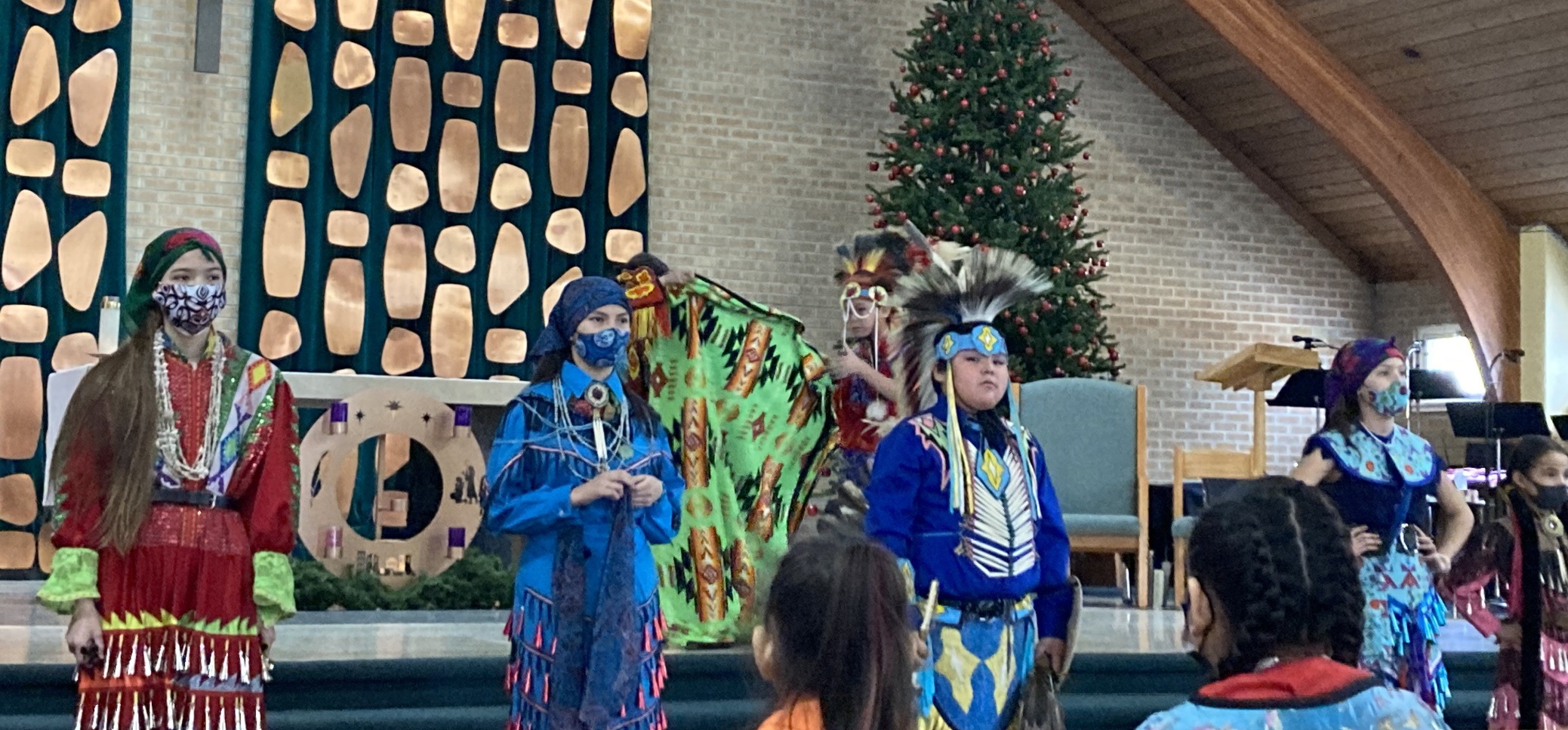
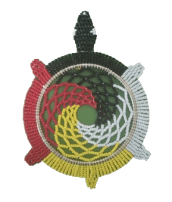
Indigenous and Community Relations Circle
Journeying together towards healing, reconciliation and right relationships with All
November – December 2021 ICRC Digest Issue 003
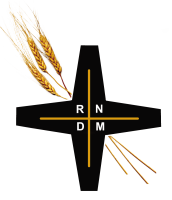
Dear Sisters,
Greetings of Joy!
During this time of year, may we welcome the Christ-Child who through His incarnation, enters into the brokenness of our life and in the world, bringing healing and new relationships that lead to reconciliation. As we walk together, may we see signs of new life and new hope being born in us and within our Church. Through this digest, we hope we can connect with you. Contributions are welcome. Share a snippet of your story. We usually publish every 15th of the month but this month a little bit late. Please send your contribution by email to maithuongrndm@gmail.com on the 10th of the month.
We Mark National Child Day - November 20
On November 20th each year, the United Nations commemorates Universal Children’s Day, the day upon which the UN General Assembly adopted the UN Convention on the Rights of the Child in 1989. This convention, almost universally ratified among UN Member States, is a fundamental framework that outlines the basic requirements for a child’s flourishing and development of his/her potential.
In Canada, November 20th is celebrated as a National Child Day, during when we honour children and strive to ensure their rights are respected. In 2021, the Mary Ward Centre marked National Child Day with a special prayer service to remember and honour indigenous children and to stir up our hearts to action to protect and promote the rights of all children, but especially those who are most vulnerable. We share this prayer service for your reflection and we invite all our RNDM partners to join us in 2022 as we continue to advocate for the rights of all children.
Here is a link to National Child Day article:
Celebrate National Child Day
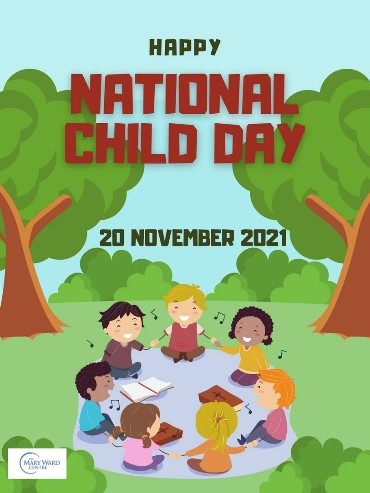
Walking the Path of Truth and Reconciliation – An Advent Journey
The Mary Ward Centre, in partnership with the Loretto Sisters and Loretto Maryholme Spirituality Centre, was honoured to collaborate with the RNDM Sisters in developing and facilitating the Advent reflection series, “Walking the Path of Truth and Reconciliation”. This was an experience of true co-creation, as we met each week to review the content for that Saturday’s reflection. There was opportunity for sharing and conversation, building bonds across our congregations, in a commitment to journey together and work towards justice for our Indigenous sisters and brothers in this land.
The reflections were meaningful and relevant, incorporating traditional teachings, historical truths, heartfelt prayer, and contemporary music. Each element offered a deeper entry point into the reality of our collective journey of truth and reconciliation, a journey of healing.
The Mary Ward Centre is deeply grateful for the friendship and collaboration of the RNDM Sisters and we are simultaneously humbled by and enthusiastic at the prospect of future endeavours with you and our continued journey toward justice. Thank you, migwich.
[Submitted by Sarah Rudolph, ibvm]
Tkaronto Engagements
I am pleased to share that I have had several interviews done for my thesis project. No, I have not forgotten about that! For an overview, please refer to https://www.pinoytrc.info/. I hope to finish these interviews by the end of this year. I also probably need to make a few adjustments in my data gathering methodology so that I could move on with my life. I am committed to get this done as soon as humanly possible.
I had the opportunity to offer some reflections to the Serra International (Downtown Toronto) on the topic of truth and reconciliation from the perspective of a religious missionary. Saint Junipero Serra’s canonization in 2015 was very controversial and was actually opposed by members of Indigenous communities. Until now, there are still tensions around this. Some of his statues were vandalized or toppled down.
On Dec 2, Filipino Catholics in the Archdiocese of Toronto closed the two-year long commemoration of the 500 years of Christianity in the Philippines. Although in the liturgy there was no mention of the idea of colonization, the organizers asked me for an article to be published in the commemorative book on Filipino Catholics’ participation in the truth and reconciliation process in Canada. I was able to insert the Filipino colonial experience in that reflection.
Other events that I participated in were: Honoring the Ancestors at the Native Peoples Mission, an online prayer on the National Child Day at Loretto House (Mary Ward Centre through Sarah Rudolph prepared a liturgy with Indigenous themes.). There were two webinars that I attended: Acknowledging Our Past by Andrea Carandang and Indian Residential Schools: A New Awakening in Canadian Consciousness by Sr. Marie Zarowny, SSA. The Cardinal’s Dinner theme this year was on healing and reconciliation. The video that they have produced can be accessed through this link: https://youtu.be/BUOFwzJT-uE
December 12 is the National Day of Prayer in Solidarity with the Indigenous Peoples. This day is also the Feast of Our Lady of Guadalupe. It fell on a Sunday so we were able to gather as a community in the Native Peoples Mission to mark this event.
[Sr. Petite Lao, RNDM]
Solstice Pipe Ceremony: Regina, SK
On the December solstice Patricia was invited to a Pipe Ceremony in Wascana Park. The indigenous Ceremony is about honouring Mother Earth. The ceremony also celebrates Matriarchs connecting Mother Earth and the strength of the woman. Each of the 13 tents had a matriarch lifting a pipe in prayer and reclaiming their role as leaders in the community.
The men supported the women by putting up the tipis the day before, preparing the wood for the fire in each tent throughout the ceremony and feast that followed. Covid Protocols were followed throughout.
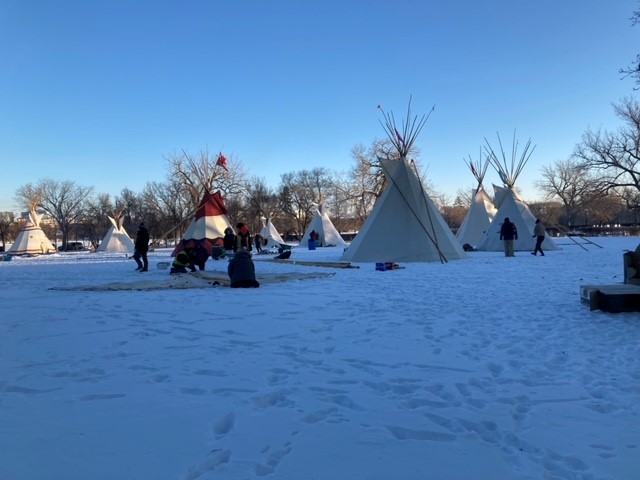
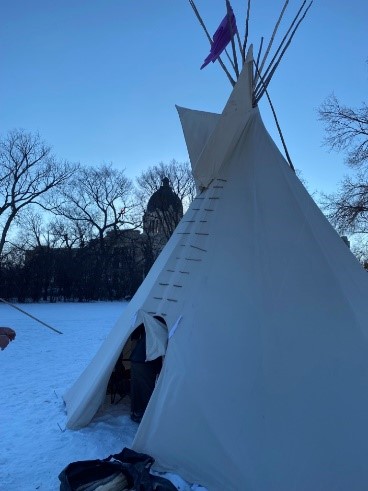
Mayor Sandra Masters was invited to a tipi as well. She said afterwards” the power of healing comes with so many pipes lifted in Prayer.” The path to reconciliation is walked as we gather for ceremonies such as this Pipe ceremony.
[Sr. Patricia Orban, RNDM]
Listening, Connecting, and Walking in Solidarity
Over the past months, we have been hearing about the recovery process of unmarked graves at Residential School sites in Canada, which has reached the consciousness of our church and the larger community in a new way. The pain and trauma caused by these schools has always been at the forefront for Indigenous Peoples, especially for Survivors who attended them. There is a renewed commitment in the church to support and walk with Indigenous Peoples on this path of truth and reconciliation.
We know that this will be a long journey, and we are prepared to do what is necessary to move towards right relationships with Indigenous Peoples. Listening, offering an apology, making amends, and walking together in solidarity with Indigenous communities will all play a part. The Truth and Reconciliation Commission’s call to Action #61 will be a roadmap to draw upon. Those around us will be “watching our feet” to see how we fulfill our commitments to reconciliation.
Bishop Don and Sr. ReAnne Letourneau have been in conversation with Residential School Survivors, Elders and Indigenous community members, asking them about what solidarity and support is needed from their perspective. Here is some of what they have heard:
- That Indigenous spiritual leaders can assist in facilitating a way forward;
- That financial support should be prioritized for the needs of survivors;
- That a Regina-based initiative guided by survivors could help with healing and intergenerational trauma caused by Catholic – operated Residential Schools;
- That assistance would be welcome with work related to cemeteries connected with Catholic- operated Residential Schools;
- That building connections with parishioners of Catholic parishes, especially those near First Nations communities, are an important part of the reconciliation journey.
As we create pathways and structures to build relationships and share resources in a good way, we are conscious of how important it is not to repeat the mistakes of the past. The main guidance on this journey must come from Indigenous survivors, Elders and spiritual leaders, with the church’s role being to support, listen, connect, and walk in solidarity.
[from a bulletin of St. Cecilia Parish – Regina]
Leaning Into Faithful Climate Conversations
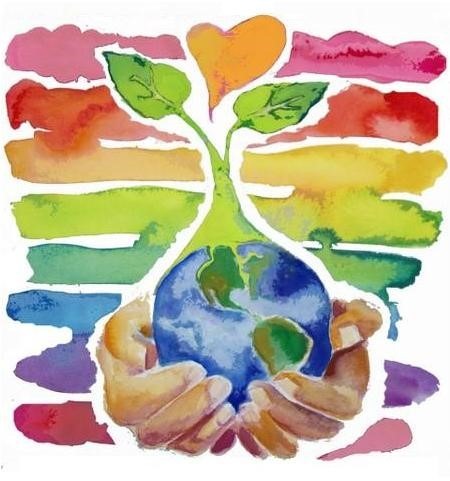
Following the 2021 Fall Symposium held by For the Love of Creation, the national ecumenical initiative seeking climate justice, I volunteered to join a Training Day on November 10 for the facilitation of Faithful Climate Conversations. About 25 were present for this, expressing the desire to meet monthly for the exploration of relevant resources as well as some actual experience of FCCs in practice. The next meeting of the group, now called the Faithful Climate Conversations Facilitators Network, took place on December 15. We were a smaller group this time, 13 in all. Petite was also present.
As you would remember from following the FLC initiative over the past year plus, recognition of indigenous knowledge and voices is essential to this perspective on the climate movement.
Quoting from the FLC website, “For the Love of Creation recognizes that Indigenous peoples’ care of and relationship with the land, their experiences of resource extraction and climate change, and Indigenous rights, including the right to free, prior and informed consent, are central to climate justice.”
During the December 15 zoom meeting, Rev. John Snow Jr and Tony Snow, brothers, indigenous ministers in the United Church, and direct descendants of signatories to Treaty Number 7 (southern Alberta area), shared input and offered to field questions from the group. I appreciated their presentation of a timeline of indigenous people’s advocacy dating back to 1971. I understood from them, that, at this point in time, treaties, the United Nations Declaration on the Rights of Indigenous People (UNDRIP), and the Truth and Reconciliation Commission of Canada (TRC) provide reliable bases for decision-making in charting future short- and long-term steps.
Our resource persons also shared an insight of Vine Deloria Jr. (1933-2005), a member of the Standing Rock Lakota (Sioux) nation and renowned activist for Native American rights, regarding intercultural opportunities for dialogue: “structural windows” offer possibilities for arriving at a common understanding around issues, even when the parties are operating from diverse paradigms, i.e. perspectives that may be more linear or wholistic in understanding. They referred to Deloria’s book, “We Talk, You Listen,” for more on this; the title is intriguing in itself!
(I was reminded, too, of our RNDM interculturality, wondering about the application of this concept to intercultural situations in our congregation communities and ministries…?!)
Having been away from the Canadian context for so many years, I feel that I am only skimming the surface of what has evolved in this area of ministry. And so, I listen and learn what I can, and am grateful for the opportunity to be present and participate, without knowing where it is leading.
For anyone interested, there is more information about these monthly meetings on the FLC website, and the invitation to join is open to all. I understand that a sample Faithful Climate Conversation will be featured in January. May the New Year bless us all with renewed hope.
[Sr. Claudia Stecker, RNDM]
A “Blue Christmas” Service at Kateri, Winnipeg
This service was for anyone who is ‘feeling down’ or grieving during this season of Advent and Christmas. As a church community we came together on the 13th of December to pray and be in solidarity with people who feel lost, lonely, or afraid at the loss of their dear and loved ones. A good number of people came for this unique prayer service.
At the entrance door to the sacred space, each person was given a blue ornament, on which to write names or words of our brokenness, as well as any fond memory about a beloved missing person, and hold it gently. In silence, each person recalled the loss of this loved one, or the pain of broken relationship, the insecurity of unemployment and poverty, the weariness of ill health, the burden of addiction, and the pain of isolation. Following this time of silence, we had a time to share in a group of 3 or 4. We were then invited to hang the decoration on the Christmas tree which was decorated in blue; to ‘let go’ this sacred symbol of our grief, allowing the tree to carry away the sorrow and pain, and bear our burdens.
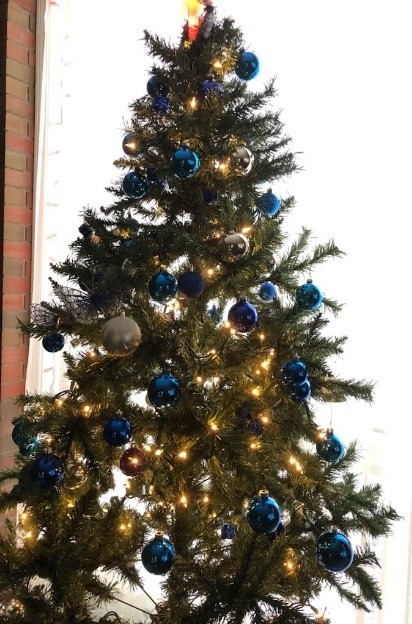
It was a beautiful and meaningful service where everyone who had come to participate felt satisfied and appreciative.
As each person offered their personal wound to the God who loves each of us deeply, and wants to carry our pain, I had a sense of God who waits patiently, gently calling out; ‘Give me your pain; come to me… all of you who are tired from carrying heavy loads and I will give you rest. (Mt 11: 28)
[Sr. Jacinta Dkhar, RNDM]
The Tipi Teaching
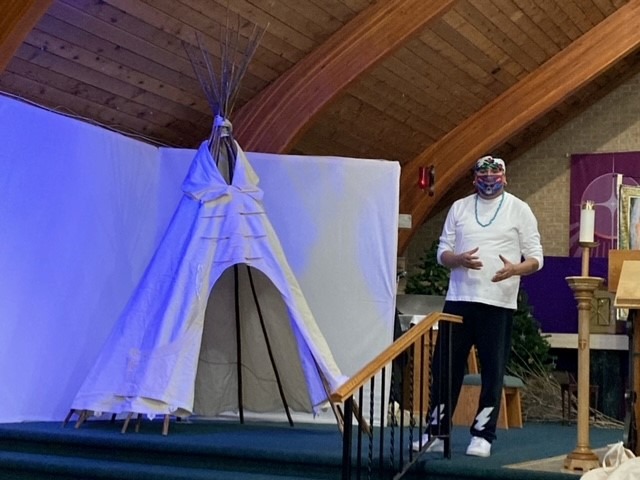
Getting to know and walking together, listening to their stories of our Indigenous brothers and sisters has been our topmost priority.
As we navigate different areas and try to build relationships with our indigenous brothers and sisters we learn more. This time there was another occasion to learn a little more about First Nations. We were very lucky to have with us a young man named Terence from a First Nations who is knowledgeable and knows his culture and tradition very well. He was very happy and mingled with us and taught us how to make the Tipi.
Traditionally we know that Jesus was born in a manger and that has passed on through generations. Today we value and practice those traditions. St Cecilia parish offered to have a Tipi which upholds the rich culture and traditions of this land to show Jesus born in a Tipi. Terence took time to introduce to us things that are used in Tipi making which was amazing. One of the things that I liked and learned is that Tipis are made by women. Men were seen as a providers. Poles that are used in the Tipi convey different meaning and symbolize rich values and traditions of the families.
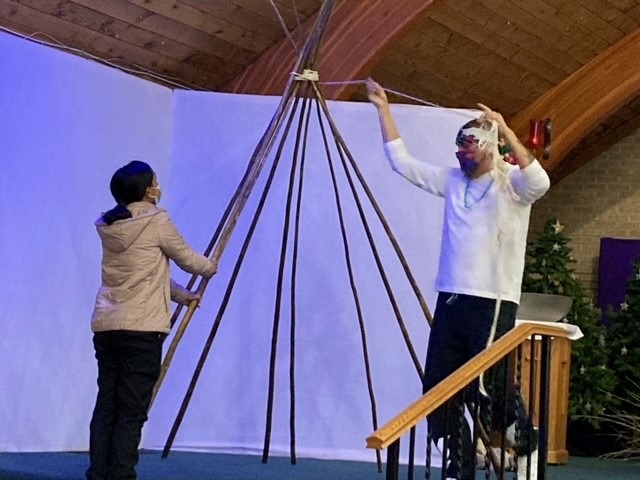
Those are: 1 .Obedience 2. Respect 3 Humility 4. Happiness 5. Love 6. Faith 7. Kingship 8. Cleanliness 9. Thankfulness 10. Share 11. Strength 12. Good child rearing 13. Hope 14. Ultimate Protection 15. Control flaps from wind.
Since we were a small group in the learning sessions we were also able to participate in Tipi making. Thanks to Terence who gracefully shared with us his knowledge.
[Sr. Pricilla Lugun, RNDM]
Our Lady of Guadalupe: Regina, SK

On December12th, Pricilla, Thuong and Patricia participated in a celebration to honour Our Lady of Guadalupe. An invitation was sent to all the parishes in the Archdiocese. Some indigenous peoples attended and many non-indigenous.
It was held in the afternoon at St. Cecilia’s parish. Joe Kingfisher opened the celebration with the heartbeat sound of the drum and song in Cree. His children Phyllis and Terrance Littletent had prepared their children to dance a story of a Protective warrior scout who led three wise maidens bearing gifts to Jesus. May Denosmie told the story of the Our Lady’s appearance to Juan Diego. The Bishop gave a short homily. Fr. Weckand thanked everyone by name for their part in the celebration.
In closing, Sr. ReAnne and May lead us in a decade of the rosary and we closed with a song to Mary in Cree and English. Afterwards, the non-indigenous people expressed how touched they felt by the joy of the celebration. One lady was moved and said “how can we bring this to our parish.” The truth of the indigenous spirituality is creating Reconciliation in events like this one.
[Sr. Patricia Orban, RNDM]
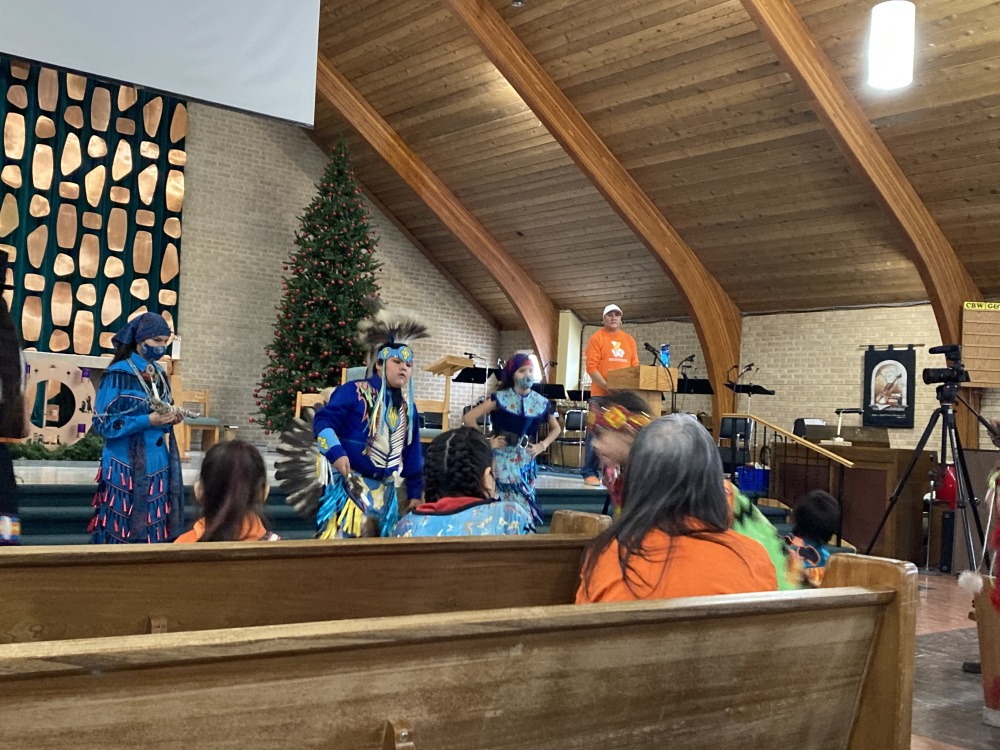
Merry Christmas to Everyone!
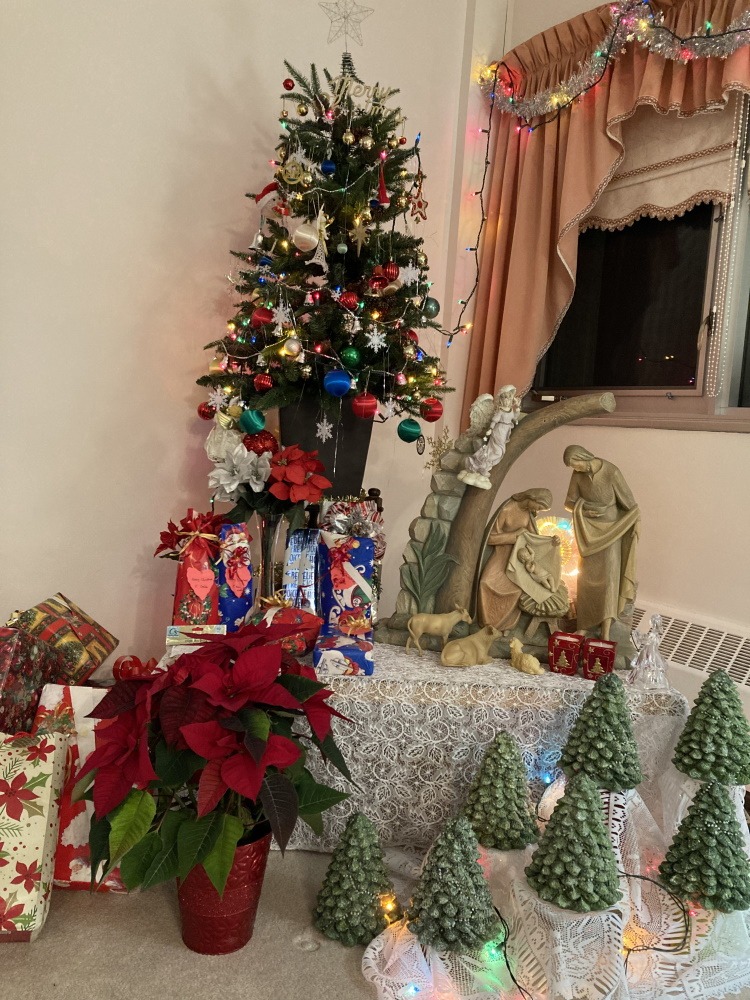
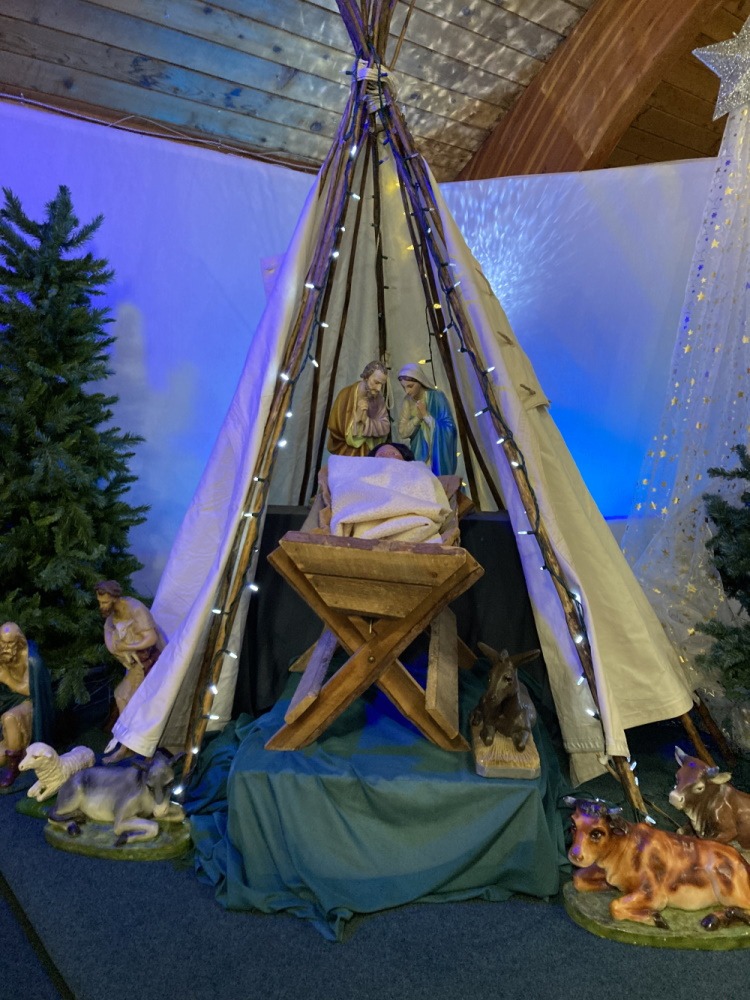
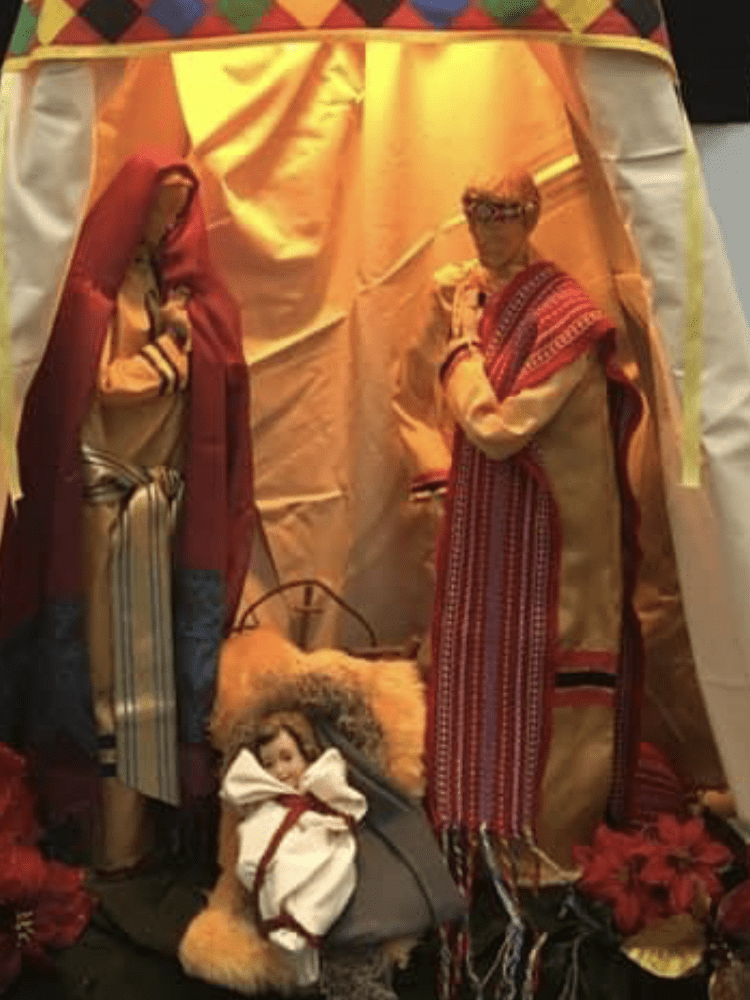
Sisters of Our Lady of the Missions
393 Gaboury Place
Winnipeg, MB
Canada
R2H 0L5
Phone: (204) 786-6051
Fax: (204) 691-0640
